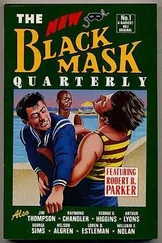‘I seemed a bit intent a moment ago, you say, on grinding my brothers’ necks to gristle? I confess – but that was a moment ago, and now I’ve changed my ways. Could you bear to see such an open-minded turtle die?
‘Lift me up, lift me up, gentle hearts – lift me up to let me look one last time at the top of the heap where once I ruled so.’
And with that most slowly drew in his dark tail. His flippers grew rigid. His struggles forever ceased.
The wisest of turtles was dead.
Just as Bing Crosby came onto the juke singing I Aint Got Nobody .
‘What’ll it be, boy?’ the waiter asked.
Dove didn’t hesitate. ‘I’ll take the tarpon soup.’
He didn’t yet know that there was also room for one more at the bottom.
IN THE CHEERY old summer of ’31 New Orleans offered almost unlimited opportunities to ambitious young men of neat appearance willing to begin at the bottom and work their way up the Ladder of Success rung by rung. Those with better sense began at the top and worked their way down, that route being faster.
In the cheery old summer of ’31 some states were dry and some states were wet. Russ Columbo was singing Please . Al Capone was quoting Mark Twain and someone held women to be equal in aviation to men. A woman refused to answer the questions of a Senate committee and the American Legion claimed that state legislatures were handicapping sales of products turned out by the American working man.
A New York minister discovered that Jerusalem had had a worse administration than Jimmy Walker’s and said he’d rather live under Hoover any day than Hezekiah.
The excesses of that year were due to a backward swing of the moral pendulum, Harry Emerson Fosdick proclaimed, adding that if the saloon were still around it would be even worse. The President pressed a button in Washington that lit a fifty-two million-dollar building, highest yet raised by the hand of man, at Thirty-Fourth Street and Fifth Avenue in New York. Wallace Beery was saying What I Like About a Mama is Plenty of Mama and cotton prices dropped to a new low.
The Ladder of Success had been inverted, the top was the bottom, and the bottom was the top. Leaders of men still sporting gold watches were lugging baby photographs door to door with their soles flapping. Physicians were out selling skin lighteners and ship captains queued in hope of a cabin boy’s mop and pail.
Offices of great fire insurance companies went up in smoke, which seemed no more than just. When the fire department – long unpaid – cleared off, little remained but scorched files, swivel-chairs on which no one would ever swivel again, lovely heaps of frosted glass, and all that mahogany.
All that mahogany that hadn’t helped anybody but brokers after all. Then the brokers began jumping off rooftops with no greater consideration for those passing below than they’d had when their luck was running. Emperors of industry snatched all the loose cash on which they could lay hand and made one fast last run. Lawyers sued one another just to keep in practice.
And every bughouse had one little usurer hidden away in a cell all his own where he did nothing but figure percent with his fingernail on the wall, day after day after day.
In less time than it takes to say God with your mouth open, the go-getting door-to-door canvasser became the backbone of the American economy. He went to work for Realsilk Hose or Hoover Vacuum long enough to go-get himself a dozen pair of Realsilk hose or a second-hand sweeper by stealing it part by part. There was also small change, milk money and such, left lying about on shelves and sills while housewives studied one proposition or another. Change-snatching too came under the head of go-getting, for hundreds subsisted upon it week in and week out.
However, the secretary of the Federation of Labor pointed out, Business was resisting further decline.
Self-reliance for the penniless and government aid to those who already had more than they could use was the plan. But park benches were wet of a morning whether it rained or no; and it was possible to tire even of bananas.
Still and all times weren’t as hard as some people grew fond of pretending. All that had happened really was a withdrawal from abnormal prosperity with business progressing on a downward grade toward new planes of normality and increasing equalization of opportunity. In short, we were going full steam ahead. Only this time one exciting opportunity was precisely as good as the next exciting opportunity. Which was to say, simply, that nobody got paid any more.
The pimps alone didn’t seem to catch on that the country was progressing downward to new rates of normality. They had been progressing downward for some time without even knowing that they were in style. Now of a sudden they discovered themselves with more girls than beds to put them on. Scarcely-twenties looking for a daddy, any old daddy who’d tell them where to lie down. Landlords and landladies passed them on to the cabbies and the cabbies passed them on to the pimps. It was then, between prostitution and Prohibition, that the ancient color line was finally breached.
Negro bellboys had gained a virtual monopoly on the delivery of illicit alcohol and had found that white male guests either wanted a woman with the bottle or a bottle with the woman. This errand boys’ work evolved into soliciting. Immediately, he looked with scorn upon his own women. Like the Negro policeman, the Negro ponce was harder on his own people than was the white pander.
He saw now at first hand, that what his Mama had told him wasn’t true after all: that ‘good’ white folks never acted like bad black ones. For he saw men and women with the best names in town, the do-right names, howling like wolves in the Saturday stews, panties on the bedpost and pants on the floor, yet knew Do-Right Daddy would be back with his family, come Sunday morning, in the pew with the best name in town.
The Negro began losing his awe of the white women there and then. He gave her the choice of moving over or being turned in to the law. The errand boy became an informer as well as solicitor. Times weren’t as bad, he felt, as the papers made out.
Everyone was out soliciting in one commodity or another. Everyone was pecking somebody else’s door. The whole town was out pecking, nobody stayed home to buy. Either you rapped doors on commission or you organized a chance of fools even sillier than yourself into crews and took your commission out of theirs. And since theirs was purely theoretical, it followed yours must be theoretical too.
If, for example, you swindled a housewife into signing for delivery of two pounds of coffee twice a week for twelve weeks, you received two theoretical dollars for perpetrating the swindle. Actually, however, you had swindled her for nothing, because the driver accredited himself with the order – ‘that party changed her mind. You know how women are,’ he advised the door-to-door man.
The driver in turn was victimized by the device of deducting two dollars from his regular salary in lieu of that same housewife’s deuce. By the time that the deuce had found its way from wife to owner’s pocket, there wasn’t a man on the street crew who had been on it the week before.
Dove Linkhorn, now in a seersucker suit and sea-green tie, stood on the corner of Calhoun and Magnolia. That here stood a man far above the blue jean and Bull Durham class was plain to be seen, for he was smoking a Picayune . Indeed, he lacked only something to sell to start making his own way down the Ladder of Success as fast as the next ambitious boy. So when he saw men encircling someone or something down the street he hurried there as fast as his butter-colored shoes could make steps, in hope that someone was throwing a fit.
Читать дальше












